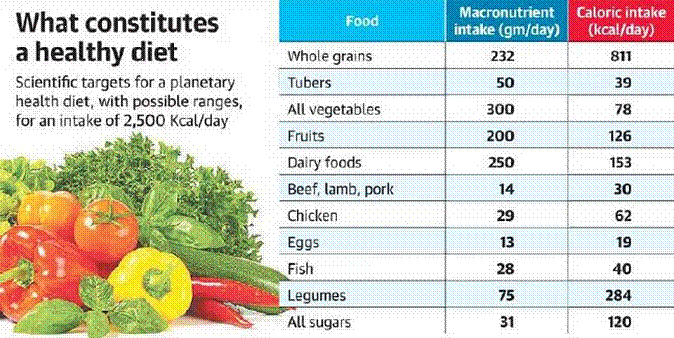World Diet Plan
17, Jan 2019

Prelims level : Science and technology
Mains level : GS: 2 “Issues relating to development and management of Social Sector/Services relating to Health, Education, Human Resources.”
Context:
- With the ideal diet, your life would be less sweet but your lifespan would be longer. Cut consumption of sugar and red meat by 50%, and increase the intake of fruits, vegetables, and nuts — that is the top recommendation of a worldwide diet plan according to a special report released on Thursday by the journal Lancet. Such a diet would not only be healthier but also more environment-friendly.
Details:
- The EAT-Lancet Commission, an independent non-profit consisting of 19 scientists and 18 co-authors from 16 countries, was tasked with developing global scientific targets for a healthy diet and sustainable food production.
- The experts on this panel from India included Srinath Reddy of the Public Health Foundation of India and Sunita Narain of the Centre for Science and Environment.
- The Commission recommended that the average adult, whose daily requirement is about 2,500 calories, must strive to source around 800 calories from whole grain (rice, wheat or corn), 204 calories from fruits and vegetables, and not more than 30 calories from red meat (beef, lamb or pork). It also suggested that the ideal diet should have no “added sugar” or “added fat”. Unhealthy diets are the leading cause of ill-health worldwide, and following this healthy diet could avoid approximately 11 million premature deaths a year, the report said.

- People in North American countries eat almost 6.5 times the recommended amount of red meat, while those in South Asia eat only half the recommended amount. All countries are eating more starchy vegetables (potatoes and cassava) than recommended, with intakes ranging from between 1.5 times above the recommendation in South Asia to 7.5 times the optimum level in sub-Saharan Africa.
Dramatic change
- “The world’s diets must change dramatically. More than 800 million people have insufficient food, while many more consume an unhealthy diet that contributes to premature death and disease,” said co-lead Commissioner Dr. Walter Willett of Harvard University.
- “To be healthy, diets must have an appropriate calorie intake and consist of a variety of plant-based foods, low amounts of animal-based foods, unsaturated rather than saturated fats, and few refined grains, highly processed foods, and added sugars.”
- The researchers also modelled the effects of a global adoption of such a diet on deaths from diet-related diseases.
- Three models each showed major health benefits, suggesting that the new diet could globally avert 10.9-11.6 million premature deaths a year.
- The report shared a road map to help global populations move towards such a diet by 2050. These include re-orienting the focus of agriculture from large-scale production of a few crops to “a diverse range of nutritious foods from biodiversity-enhancing food production systems”.






